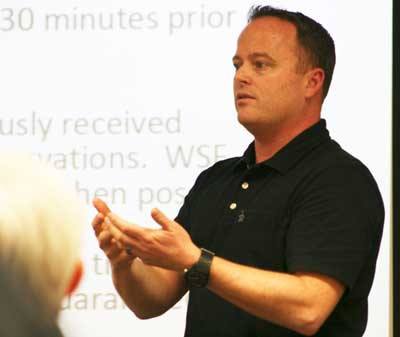If you’re feeling stressed out or frustrated about making reservations to ride the ferries, well, you’re not alone.
A crossfire of complaints greeted representatives of the state ferry system and local elected officials at a recent reservation system public outreach session. The lion’s share of the standing-room-only crowd at the April 9 meeting at the Mullis Street fire station, a WSF-led information gathering event, found little solace in statistics showing the reservation system led to an overall reduction in overloads and decrease in traffic congestion since its launch at the start the winter sailing schedule.
Nor did many seemed swayed by results of a recent “reservation-holder” survey, in which more than 75 percent of 4,248 respondents said WSF’s reservation website is “easy to use” and more than 80 percent described the terminal “check-in” system as either “good” or “excellent” (the survey, sent out to 14,626 reservation-holders, generated a 28 percent rate-of-response).
Instead, most in the room, about 55 in all, echoed sentiments similar to those shared by Steven King, and would prefer to see the whole system scrapped.
“It’s not working for us,” said King, an island resident of 22 years and self-described non-user of computers or cell-phones. “Our life has been changed, not necessarily by the legislature but by the ferry system itself. I’m going to work against that.”
Even early converts have found themselves frustrated when complications beyond their control arise.
“It was working for me, until this last Wednesday,” said Marie DiCristina, who accompanied a friend to a medical appointment off-island that lasted longer that expected. They missed a reserved sailing and a series aggravations followed, including failed attempts to make a change in reservations via the telephone, she said.
Given the growing number of internet security breeches, David Eden described having to use a credit card to make a reservation as “outrageous.”
Complaints come in all size
The list of grievances ranged from the specific, such as the reliance on credit cards and internet connections, ineffective customer-service lines and no-show fees, to the general: reservations favor tourists over islanders, snuff out spontaneity in travel, and will harm the local economy when the system snaps under the weight of the busy summer season.
Brian Churchwell, vehicle reservations system program manager, said the reservation program remains a work in progress and feedback from a series of public outreach session (one was held March 13 on Orcas Island) will help WSF fine-tune the system.
“We know it’s not perfect,” Churchwell said. “We’ve heard you and we’re conscious of that.”
Six years in the making, or more, the full-fledged reservation system went into effect in the San Juans Jan. 5, in conjunction with the start of the winter sailing schedule.
Though similar in concept, it operates differently than the Port Townsend-Keystone reservation system in that 90 percent of the auto-space of any sailing is available for reservations and time-released in 30 percent increments, beginning with each season’s schedule change, then two weeks prior to any sailing and then two days before. Reservations can be made up to two hours prior to any sailing; ten percent remains available for medical priority loading and those without reservations.
Under Port Townsend-Keystone system, first launched in 2008 and overhauled in 2012, up to 80 percent of auto-space can be reserved and the entire amount is available when the schedule changes each season.
Remedy for cash-strapped agency
An element of Washington State Ferries long-range plan, a directive handed down by the legislature in 2007, deployment of a reservation system is expected to help WSF better utilize its existing assets—boats, terminals and parking lots—while meeting an anticipated growth in ridership. By design, reservations are intended to usher travelers away from peak-demand sailings and toward those at other times of the day that historically have been less populated.
According to WSF, 55,000 vehicle reservations were used between Jan. 5 and Feb. 28. Nearly half of those reservations were made the day before a sailing and a majority, 81 percent, were made within seven days. Roughly 1,000 reservations are redeemed each day in the San Juans.
County Councilman Rick Hughes, Orcas Island, hopes the reservation not only works, but that it might also help boost ridership in the islands. He noted that a plan had been circulating earlier in Olympia that would have extended the winter sailing schedule by two months and thereby reduce carrying capacity in the San Juans as a result. He elicited support of legislatures in nine other ferry-served counties and together penned a letter that, for now, quashed that plan.
“I’m cautiously optimistic it will work,” Hughes said. “If not, and it hurts our economy, then we’ll fight to get it removed. It may not be perfect but I think we have to work with it.”




